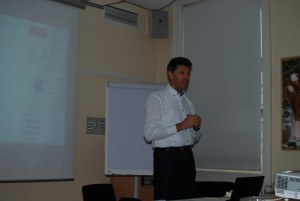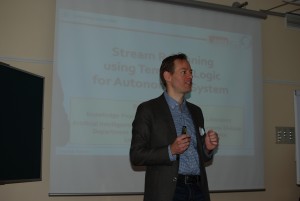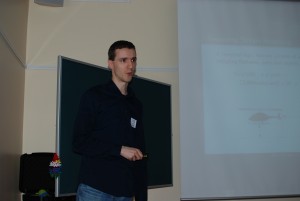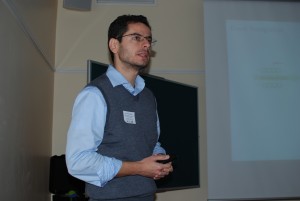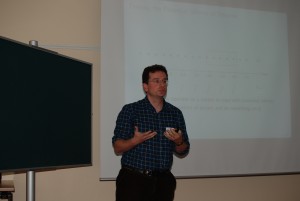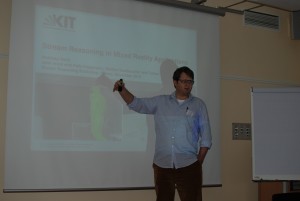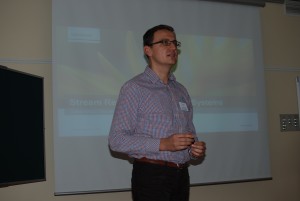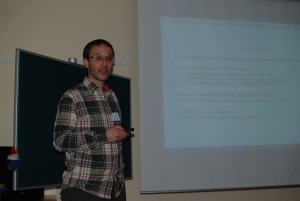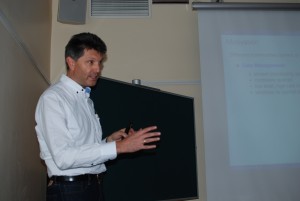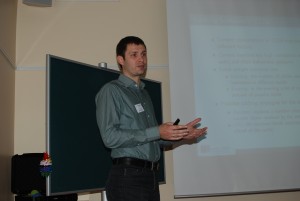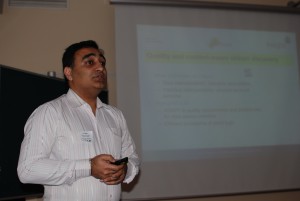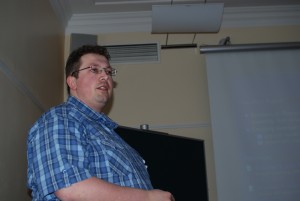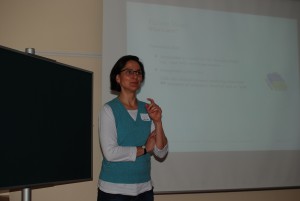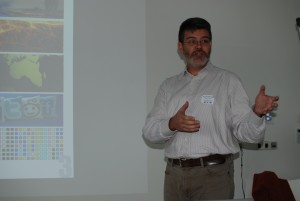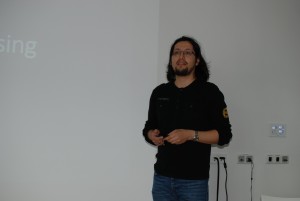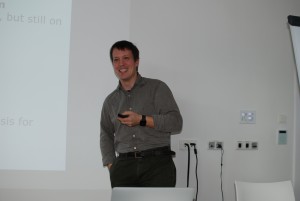Stream Reasoning Workshop 2015
The Stream Reasoning Workshop will take place from November 9 to 10, 2015 and is supported by the VCLA.
ORGANIZATION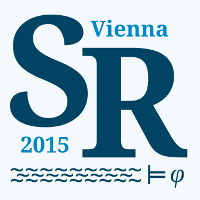
Harald Beck
Minh Dao-Tran
Thomas Eiter
Katarina Singer
AIMS AND SCOPE
Processing, querying and reasoning over streaming data is studied in different communities such as KR&R, Semantic Web, Databases, Stream Processing, Complex Event Processing, etc., where researchers have different perspectives and face different challenges.
This workshop aims at advancing Stream Reasoning as research theme by bringing together these different views and goals. In addition to invited talks, the workshop will provide opportunities for all participants to engage in discussions on open problems and future directions.
Participation is by invitation only. Registration is free of charge and includes attendance to all workshop events and lectures, coffee breaks, and lunches.
PROGRAM AND SCHEDULE
Monday Nov. 9 (at Hotel Kaiserhof)
| 08:15 |
Doors open (Coffee!) |
| 08:50-09:00 |
Welcome |
| 09:00-09:30 |
Introductions |
| 09:30-10:10 |
Keynote: Fredrik Heintz |
| 10:10-10:30 |
Talk by Daniel de Leng |
| 10:30-11:00 |
Coffee break |
| 11:00-12:40 |
Talks by Alexander Artikis, Özgür Özçep, Anni-Yasmin Turhan, Andreas Harth and Darko Anicic |
| 12:40-14:00 |
Lunch break |
| 14:00-15:45 |
Talks by Boris Motik, Thomas Eiter, Konstantin Schekotihin, Ali Intizar and Philipp Obermeier
|
| 15:45-16:15 |
Coffee break |
| 16:15-17:45 |
Discussion: Stream Reasoning Perspectives |
| 19:30 |
Dinner at Heuriger Werner Welser |
Tuesday Nov. 10 (at TU Wien)
| 09:00-09:10 |
Welcome |
| 09:10-09:50 |
Keynote: Emanuele Della Valle |
| 09:50-10:30 |
Talks by Jean-Paul Calbimonte and Axel Polleres |
| 10:30-11:00 |
Coffee break |
| 11:00-12:30 |
Discussion: The Road Ahead |
| ~12:45 |
end |
DATE AND VENUE
November 9-10, 2015
The workshop will take place at two different places:
– Monday, Nov 9: Seminar room of Hotel Kaiserhof, 1040 Wien.
The Hotel itself is at Frankenberggasse 10, the entrance to the seminar room is at the opposite side of the street, Frankenberggasse 13.
– Tuesday, Nov 10: TU Wien, 1040 Wien, Gußhausstraße 27-29
Floor 6, Room: “Kontaktraum”
Both locations are in 2-min walking distance:
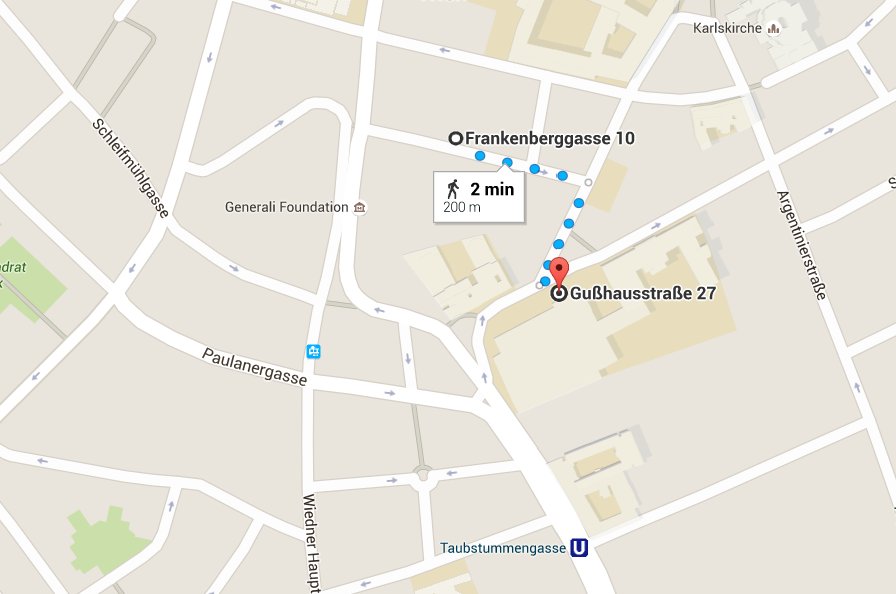
GETTING THERE
Close subway stations:
– U1 Taubstummengasse (red line)
– U1/U2/U4 Karlsplatz (red/violet/green line)
Subway Map
A single trip with the subway costs 2.20 Eur and can be purchased at all subway stations. For further information on public transport etc, see https://www.vcla.at/contact/visiting/.
TALKS
Keynotes
- Fredrik Heintz, Linköping University: Stream Reasoning using Temporal Logic for Autonomous Systems [abstract]
Abstract. High level reasoning is becoming essential to autonomous systems such as robots. Both the information available to and the reasoning required for such autonomous systems is fundamentally incremental in nature. New observations become incrementally available over time and there is a need to reason about this information with minimal delay as it becomes available. A flow of incrementally available information is called a stream and reasoning over streams is called stream reasoning. Incremental reasoning over streaming information is necessary to support a number of important functionalities such as situation awareness, execution monitoring, and decision making. To be useful to robotic systems the reasoning has to be grounded through sensing. DyKnow is our practical framework for semantically grounded stream reasoning. Incremental reasoning over streams is achieved through efficient progression of metric temporal logical formulas. The reasoning is semantically grounded through a common ontology. This allows the grounding of symbols through semantic matching. By using semantic mappings between ontologies it is also possible to do semantic matching over multiple ontologies. The complete stream reasoning framework is integrated in the Robot Operating System (ROS). This talk has three parts. The first part discusses the applications of stream reasoning in autonomous systems. The second part gives an overview of our stream reasoning approach based on metric temporal logic. The third part tries to give a larger picture of different approaches to stream reasoning and how they relate.
[slides]
- Emanuele Della Valle, Politecnico di Milano: Stream reasoning: mastering the velocity and the variety dimensions of Big Data at once
[abstract]
Abstract. More and more applications require real-time processing of heterogeneous data streams. In terms of the “Vs” of Big Data (volume, velocity, variety and veracity), they require addressing velocity and variety at the same time. Big Data solutions able to handle separately velocity and variety have been around for a while, but only Stream Reasoning approaches those two dimensions at once. Current results in the Stream Reasoning field are relevant for application areas that require to: handle massive datasets, process data streams on the fly, cope with heterogeneous incomplete and noisy data, provide reactive answers, support fine-grained information access, and integrate complex domain models. This talk starting from those requirements, frames the problem addressed by Stream Reasoning. It poses the research question and operationalise it with four simpler sub-questions. It describes how the database group of Politecnico di Milano positively answered those sub-questions in the last 7 years of research. It briefly surveys alternative approaches investigated by other research groups world wide and it elaborates on current limitations and open challenges.
[slides]
Regular Talks
- Daniel de Leng, Linköping University: Semantic Grounding for Stream Reasoning through Ontology-Based Introspection [abstract]
Abstract. Integrating stream reasoning in systems connected to the outside world such as robots requires grounding. To ground a symbol it must be mapped to a stream which provides the intended meaning of the symbol. An important problem is to handle situations when such a stream is not directly available but has to be generated or adapted through stream transformations. By describing stream sources and transformations by their semantics, the system is able to reconfigure itself to produce a desired stream. In this talk we first present our stream reasoning framework DyKnow which supports the evaluation of spatio-temporal logic formulas over streams. We then present our work on ontology-based introspection in support of stream reasoning including grounding.
[slides]
- Alexander Artikis, National Centre for Scientific Research (NCSR): “Demokritos” Event Calculus for Event Recognition [abstract]
Abstract. Systems for symbolic event recognition accept as input a stream of time-stamped events from sensors and other computational devices, and seek to identify high-level composite events, collections of events that satisfy some pattern. In the Complex Event Recognition lab (
http://cer.iit.demokritos.gr) of NCSR Demokritos, we use the Event Calculus for event recognition. To allow for efficient event recognition, scalable to large data streams, we developed RTEC, an Event Calculus dialect with novel implementation and ‘windowing’ techniques. To deal with the inherent uncertainty of sensor networks, we extended the Event Calculus with probabilistic reasoning. And to avoid the time-consuming and error-prone process of manual event pattern construction, we developed incremental learning techniques taking advantage of large data streams.
[slides]
- Özgür Özçep, Universität zu Lübeck: Stream Processing with Local Temporal Reasoning [abstract]
Abstract. The talk is going to discuss stream-reasoning related design principles underlying the stream-temporal query framework STARQL which is developed in the EU FP7 project Optique. In particular, two aspects will be discussed: adapting lightweight reasoning within the ontology-based data access paradigm to streams and applying temporal reasoning on streams of state sequences that are generated with explicit declarations from input streams.
[slides]
- Anni-Yasmin Turhan, Dresden University of Technology: Highly adaptive energy-efficient computing [abstract]
Abstract. In order to achieve energy efficiency in complex hard- and software systems we are employing ontology-based context recognition. The general approach is a variation of the ontology-based data access (OBDA) framework, where the background knowledge of the domain is modeled by concepts in an ontology and the data from different sources is collected in a database. The contexts to be recognized are modeled as conjunctive queries (CQs) and context recognition is performed by query answering (QA). The use of QA naturally allows to cope with incomplete information. In our project in the CRC “highly adaptive energy-efficient computing” (HAEC) the data is collected from the sensors by the OS and then cleaned and aggregated by preprocessors of the DB. In this setting we have investigated temporal QA over time-stamped DB entries, thus allowing to specify (partial) processes in the query. The use of numerical sensor data in a qualitative logic setting calls for the use of vagueness in the query language. Here, we have investigated the decidability status of fuzzy ontology languages and have identified (simplified) settings in which decidability of QA can be retained. The methods for temporal QA and fuzzy QA with DL-Lite as underlying logic has been implemented in prototype systems. In this workshop we would like to present our formal methods and are interested in finding collaborations regarding the extension of the formal methods. On the practical side we are interested in finding collaborations on the preprocessing of raw data and on the generation of test data.
[slides]
- Andreas Harth, Karlsruher Institut für Technologie: Stream Reasoning in Mixed Reality Applications [abstract]
Abstract. Mixed reality systems require flexible and low-latency combination of data from distributed sensors, scene graphs and external sources. These systems can benefit from reasoning to help overcome data heterogeneity. We present application scenarios from the areas of manufacturing and virtual product design, and derive requirements for stream reasoning in such scenarios. We further outline the architecture of interactive distributed mixed reality systems based on web technologies, and introduce Linked Data-Fu, a streaming rule engine capable of operating on distributed resources with high update rates.
[slides]
- Darko Anicic, Siemens AG: Stream Reasoning in WoT: Challenges and Opportunities [abstract]
Abstract. Web of Things (WoT) will enable machines, facilities, and networks together with advanced sensors, controls and software applications to be part of the World Wide Web. Combined with the power of data analytics, stream reasoning and deep domain expertise, it has the potential to increase performance gains across global industry sectors. In this talk we present few challenges related to stream reasoning in the domain of WoT along with our standardization activities in W3C WoT group.
- Boris Motik, Oxford University: Incremental Materialisation of Datalog Programs and its Relationship to Stream Reasoning [abstract]
Abstract. In my talk I will briefly recapitulate some of our recent work on incremental materialisation of Datalog programs. In particular, I will compare the well-known DRed approach, the less well known approach based on derivation counting that works with recursive rules, and our recently presented Forward/Backward/Forward algorithm. I will discuss the relationship between these algorithms, their pros and cons, and their relative empirical performance. I will also discuss possible ways of using these algorithms as basis for stream reasoning.
[slides]
- Thomas Eiter, TU Wien: LARS: A Logic-Based Framework for Analyzing Reasoning over Streams [abstract]
Abstract. The recent rise of smart applications has drawn interest to logical reasoning over data streams. Different query languages and stream processing/reasoning engines were proposed. However, due to a lack of theoretical foundations, the expressivity and semantics of these diverse approaches were only informally discussed. Towards clear specifications and means for analytic study, a formal framework is needed to characterize their semantics in precise terms. We present LARS, a Logic-based framework for Analyzing Reasoning over Streams, i.e., a rule-based formalism with a novel window operator providing a flexible mechanism to represent views on streaming data. The talks will present the key ideas of LARS, which may serve as formal foundation for different stream processing/reasoning systems.
[slides]
- Konstantin Schekotihin, Alpen-Adria-Universität Klagenfurt: Smart Caching in Content Centric Networking [abstract]
Abstract. Content Centric Networking (CCN) is an emerging paradigm aiming at versatile, secure and scalable networking able to deal with the growing volumes of transmitted data. The core difference between CCN and the current network architectures lies in the way CCN addresses and caches content. Thus, the content is not concentrated on a small set of network nodes (hosts), but is possibly distributed among the nodes (routers). To get the content the network users issue interest packages and the routers have either to satisfy these interests by providing the content or to forward those packages to a known content storage. However, it is unclear which content should be cached by the routers and for how long such that the interest packages can be served efficiently. Definition of one general content caching strategy, which serves interests of users best in any network situation, is very hard, if possible at all. In our work we develop a smart router that uses an adaptive caching strategy. This strategy reasons about a stream of events registered by the networking interface of a router, such as number of interests served/forwarded, timing and hops information available in package headers, and decides which of predefined caching strategies fits best. The stream reasoning of a router is implemented using DLV-HEX and follows the guidelines of the LARS framework. The first experiments on a CCN simulator indicate that correct recognition of changes in the event stream and application of a suitable caching strategy can improve the quality of service of the network segment connected to a smart router.
[slides]
- Ali Intizar, Insight Centre for Data Analytics, Galway: Towards Complex Reasoning over Big Data Streams with Answer Set Programming [abstract]
Abstract. Advances in the Internet of Things and the Web of Data created huge opportunities for developing applications that can generate actionable knowledge out of streaming data. The trade-off between scalability and expressivity is a key challenge in this setting, and more investigation is required to identify what are the relevant features in optimizing this trade-off, and what role do they have in the optimization. We investigate the need for heuristics to design adaptive solutions and, following an empirical approach, we highlight some key concepts and ideas that can guide the design of heuristics for adaptive optimization of Web Stream Reasoning. Furthermore, we consider the problem of performing complex non-monotonic reasoning over dynamic data by proposing a data-driven approach to examine how the stable model semantics of Answer Set Programming can be used for scalable processing big data streams. Future directions of investigation are aiming at analyzing distributed approaches to non-monotonic reasoning about event streams that can scale in constrained environment (i.e. where as fast as possible might not be enough) and required optimization. This include the investigation of hybrid approaches building upon the effective combination of statistical analysis and knowledge-driven inference into a consolidated body of research. The goal is to design new, comprehensive approaches for scalable stream reasoning considering run-time features and requirements, statistical relevance of streaming data patterns, complex structural dependencies, context of validity, and logical correlation in decision processes.
[slides]
- Philipp Obermeier, University of Potsdam: Stream Reasoning-Related Activities at KRR Uni Potsdam [abstract]
Abstract. This talk will give a short overview of our various research activities related to Stream Reasoning. First, we reiterate our approach based on Reactive ASP to implement sliding-window-based reasoning. Then, we explain how clingo 4’s new control API enables customizable multi-shoot solving. Eventually, we introduce some online planning applications from robotics and logistics of our DFG-project Hybris.
[slides]
- Jean-Paul Calbimonte, École Polytechnique Fédérale de Lausanne: RDF Stream Processing and the Role of Semantics [abstract]
Abstract. Streams exist on the Web on different forms. From social media feeds to stock exchange data, these dynamic flows of information are widely used in different domains and through different technologies. However, the heterogeneity of this type of data makes it hard to combine and process different sources of streams coherently. In the case of stored data, the use of semantic technologies has proven to be a viable way of dealing with this problem. Nevertheless, the current Semantic Web Standards and processing technologies still need to be adapted to cover the specificities of streaming data. In our work, we try to address these issues form both a theoretical and a practical approach, defining semantics of RDF streams and query processors for this type of data. Moreover, we advocate for an agreed model for RDF Streams, and agreed semantics that cover most of the existing RDF stream processing (RSP) engines. In these models and semantics we include the concepts of correctness, as we have also proposed means to evaluate and benchmark RSP systems. Furthermore, out work has also started to investigate practical ways of building RSP systems, ranging from the first stream-OBDA approaches, to reactive streaming systems on parallel computing frameworks. Finally, we have also proposed implementations in different domains, including environmental monitoring and the Internet of Things, where stream processing combined with Semantic Technologies is expected to play a key role.
[slides]
- Axel Polleres, Vienna University of Economics & Business: SPARQL Update with inference [slides]
PARTICIPANTS
Alpen-Adria-Universität Klagenfurt
– Bruno Bierbaumer
– Hermann Hellwagner
– Konstantin Schekotihin
Dresden University of Technology
– Sebastian Rudolph
– Anni-Yasmin Turhan
Eidgenössische Technische Hochschule Zürich
– Dmitriy Traytel
École Polytechnique Fédérale de Lausanne
– Jean-Paul Calbimonte
Fraunhofer Institute for Open Communication Systems (FOCUS) / Technical University of Berlin
– Manfred Hauswirth
Insight Centre for Data Analytics, Galway
– Ali Intizar
Karlsruher Institut für Technologie
– Andreas Harth
Leipzig University
– Jörg Pührer
Linköping University
– Fredrik Heintz
– Daniel de Leng
– Mattias Tiger
National Centre for Scientific Research (NCSR)
– Alexander Artikis
Oxford University
– Boris Motik
– Alessandro Ronca
Politecnico di Milano
– Emanuele Della Valle
Siemens AG
– Darko Anicic
TU Wien
– Shqiponja Ahmetaj
– Harald Beck
– Minh Dao-Tran
– Thomas Eiter
– Elmar Kiesling
– Patrik Schneider
– Peter Wetz
– Stefan Woltran
Ulm University
– Markus Brenner
Universität zu Lübeck
– Özgür Özçep
University of Luxembourg
– Pouyan Ziafati
University of Potsdam
– Philipp Obermeier
– Orkunt Sabuncu
– Torsten Schaub
Vienna University of Economics & Business
– Albin Ahmeti
– Javier Fernandez
– Axel Polleres
Vrije Universiteit Amsterdam
– Stefan Schlobach
– Jacopo Urbani
PHOTOS


